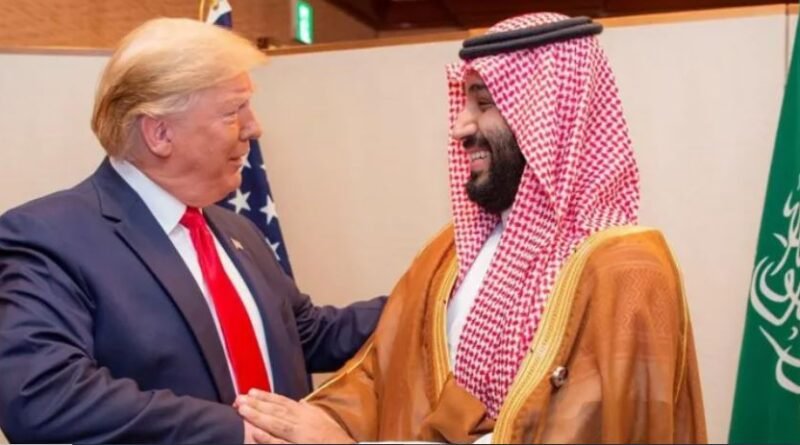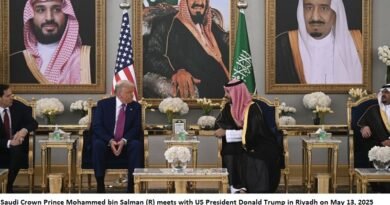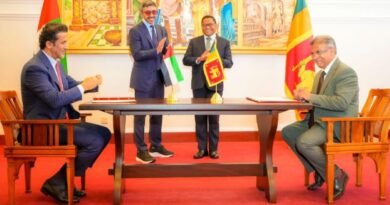Trump Heads to Saudi Arabia Seeking Major Investment Deals for U.S.
By Caroline Ameh
U.S. President Donald Trump is set to arrive in Riyadh on Tuesday, 13 May, as he embarks on a three-day tour of Gulf states, with a key objective: securing billions of dollars in new investments to bolster the American economy.
Trump is scheduled to meet with Saudi Arabia’s de facto ruler, Crown Prince Mohammed bin Salman, and attend a summit of Gulf leaders on 14 May. His itinerary includes stops in Qatar and the United Arab Emirates (UAE) before concluding the visit on 15 May.

According to Karen Young, a senior fellow at the Middle East Institute, Trump aims to make a strong public show of Gulf investment in the U.S. “He wants the announcement [of more Gulf money for the U.S.],” she said. “He wants to have a big poster in a meeting that describes where these investments might go—and some estimation of what they will do for the American economy in terms of job creation or his big push on domestic manufacturing.”
Trump’s visit underscores the strategic economic ties between Washington and the Gulf. It was originally planned to be his first overseas trip of his second term in office, a symbolic gesture that mirrors his first term when he also chose Riyadh as his initial foreign stop—deviating from the traditional U.S. presidential practice of visiting allies like the UK, Canada, or Mexico first. However, the recent passing of Pope Francis required Trump to travel to Rome for the funeral in late April, delaying this visit.
The timing of Trump’s Middle East tour comes amid slowing U.S. economic growth. The country’s economic output fell in the first quarter of 2025—its first contraction in three years—following disruptions caused by new import tariffs and shaken global trade confidence.
Against this backdrop, Trump is pressing for more direct investment from Gulf sovereign wealth funds. Saudi Arabia’s Public Investment Fund (PIF), which holds $925 billion in assets, already has high-profile U.S. holdings, including Uber, gaming company Electronic Arts, and EV manufacturer Lucid Motors. In January, Crown Prince Mohammed announced a pledge to invest $600 billion in the U.S. over the next four years—an amount Trump now wants increased to $1 trillion, including new military procurement.
Ali Shihabi, a Saudi political analyst with close ties to the government, confirmed that several economic agreements are expected to be signed during Trump’s visit. “These deals will further integrate the Saudi and U.S. economies—joint ventures in the kingdom and the United States, procurement of American weapons and goods,” Shihabi said.
A major U.S.-Saudi investment forum on 13 May in Riyadh is drawing top figures from Wall Street and Silicon Valley. CEOs from companies including BlackRock, Palantir, Citigroup, IBM, Qualcomm, Alphabet, and Franklin Templeton are attending, underscoring the significance of the visit.
Meanwhile, the UAE has already pledged to invest $1.4 trillion in the U.S. over the next decade, targeting sectors such as artificial intelligence, semiconductors, energy, and manufacturing. This commitment followed a March meeting between UAE National Security Adviser Sheikh Tahnoon bin Zayed Al Nahyan and President Trump in Washington.
Despite these staggering figures, Karen Young cautions against overly optimistic interpretations. “The scale of these investments is not realistic in the short term,” she said. “These are long-term strategic moves, and the figures should be taken with a grain of salt.”
Among the most anticipated outcomes of Trump’s visit is a reported $100 billion arms deal between Saudi Arabia and the United States. The agreement is expected to include purchases of missiles, radar systems, and transport aircraft.
While the U.S. has long supplied arms to Saudi Arabia, the Biden administration had paused the sale of offensive weapons in 2021 due to concerns over the war in Yemen and the killing of journalist Jamal Khashoggi—a murder U.S. intelligence reported was approved by Prince Mohammed. The sales resumed last year, with U.S. officials citing Saudi efforts to scale back military operations in Yemen and offering support for Gaza-related diplomacy and reconstruction.




